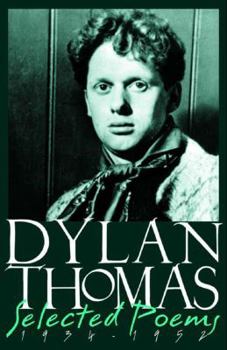Dylan Thomas Selected Poems, 1934-1952
Select Format
Select Condition 
Book Overview
Dylan Thomas (1914-1953) prepared this volume in 1952--the author's choice of the ninety poems he felt would best represent his work up to that time--and it was published by New Directions in 1953 as The Collected Poems of Dylan Thomas , shortly after his death. This book was then and remained, for all practical purposes, Thomas's "collected" poems and in that sense complete. However, with the 1971 publication of the 192 poems in The Poems of Dylan...
Format:Paperback
Language:English
ISBN:0811215423
ISBN13:9780811215428
Release Date:April 2003
Publisher:New Directions Publishing Corporation
Length:240 Pages
Weight:0.54 lbs.
Dimensions:0.7" x 5.2" x 8.0"
Customer Reviews
5 ratings
Brilliant Poet
Published by Thriftbooks.com User , 14 years ago
Dylan Thomas will interest anyone with even a basic appreciation of poetry. Some dark and some inspirational- give it a chance! You won't be dissappointed.
The fire of birds in the world's turning wood
Published by Thriftbooks.com User , 16 years ago
This reader has had the first 52 lines of Dylan Thomas's "Author's Prologue" memorized since the age of sixteen, and has a semi-firm grasp of the remaining 50 lines of the poem. In the absence of unforgettably solemn liturgies or a culture immersed in scriptural cadences, Thomas's poems fulfilled for this reader the same function than the Authorized Version of the Holy Bible fulfilled for many previous generations of English-speaking poets: making us fall in love with the sound of the word. Thomas is not always clear and comely, rarely dulcet and decorous, raucous oftener than reverent (he sometimes manages to be both!), but he is never hackneyed and almost impossible to forget. Some of the effects in "Poem On His Birthday" and "Over Sir John's Hill" are as lovely and intricate as anything by Gerard Manley Hopkins, e g: "this sandgrain day in the bent bay's grave" or "flash, and the plumes crack, and a black cap of jackdaws Sir John's just hill dons." In the earliest eighteen poems, we have a kind of 20th-century retelling or paraphrase of the Book of Genesis (there is a poem called "In the Beginning"), with William Blake's Songs of Innocence and Experience and perhaps Auden, Lawrence, and Freud as tributary influences. The later lyrics of nostalgia, "Fern Hill" and "Poem in October," exert an undeniable charm, and the wartime elegies ("A Refusal to Mourn the Death by Fire of a Child in London" most notably) have a furious splendour. The villanelle, "Do Not Go Gentle Into That Good Night," is immortal. The flaws in Dylan Thomas's aesthetic are somewhat obvious -- making the sound of the language into a kind of religion is not the most prudent course. And the failures, when they occur ("Once Below a Time") are crashingly abysmal. But we retain our familial loyalty to Dylan Thomas, who sang to the best of his love as the flood began, the moonshine-drinking Noah of the bay who sings still in these ineffaceable poems, around the globe from Laugharne to Lesotho, from Swansea to Sandusky -- wherever his books are found, opened, and cherished.
the Walt Whitman of Wales
Published by Thriftbooks.com User , 18 years ago
Dylan Thomas takes free verse into the next level (and regular verse into the next universe "Do not go Gentle into that Good Night") Dylan Thomas is one of the last of the great poets after W. B. Yeats. Dylan Thomas reigns forever.
Words Well Written
Published by Thriftbooks.com User , 18 years ago
Dylan Thomas creates poems that are great to speak and use words that are truly magically placed. In my opinion, his books are the best for this type of poetry, so the person who purchases this book will likely find themselves reading these, even if only to themselves, out loud. My copy of this book was published in the 1950s, however I hope to buy this paperback version to carry with me.
Dylan's greatness as a poet A power of feeling and music all his own
Published by Thriftbooks.com User , 19 years ago
The greatness of Dylan Thomas is in his music and voice, a powerful rolling seasound. It is too in that whole mysteriously rich vocabulary, that unique diction of his own a diction which like that of Hopkins , and Dickinson seems to strike us as wholly original. The greatness of Thomas is too in his human feeling. "Do not go gentle into that dark night, Rage Rage Against the Dying of the Light". He stuns us startles and surprises us with lines of incredible beauty.






